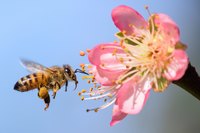In the same section
-
Share this page
EOS research project CliPS
Climate change and effect on Pollination Services
 Pollination is a major ecosystem service provided by various pollinators (such as bees). Pollinator biodiversity have a direct economic impact in agriculture. Different threats have however been recognised to increase the pressure on pollinator communities.
Pollination is a major ecosystem service provided by various pollinators (such as bees). Pollinator biodiversity have a direct economic impact in agriculture. Different threats have however been recognised to increase the pressure on pollinator communities.The project CliPS focus on understanding the impact of climate change on pollinators and their services forms. Researchers will focus on wild and managed bees and estimate their pollination efficiency on two focal crops : apples and sunflowers. CliPS will also characterize climate adaptations mechanisms : under future warming scenarios, populations of individual species are expected to shift in space (i.e. move to the North) and time (i.e. earlier emergence), while some important crops (like apple trees) are expected to experience a delayed and extended flowering. These projections will allow researchers to evaluate the expected distributional changes of pollinator species for 2050 and 2100, projected onto Spain, France and Belgium, and at the European scale.
Led by Gent University, the project associates the Université de Mons and the Université Libre de Bruxelles (Nicolas Vereecken – Agroecology & Pollinisation group, Faculty of Sciences).
Dates
Created on August 13, 2018
